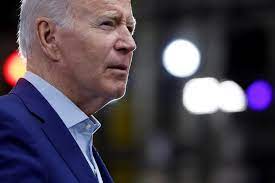Executive Order by Biden Limits US Investments In Chinese Technology
The government said that President Joe Biden’s executive order to prohibit and control high-tech investments from the United States flowing to China was targeted, but it also reflected the escalating rivalry between the two greatest powers in the world.
Artificial intelligence, quantum information technology, microelectronics, and sophisticated computer chips are all included in the sequence. The endeavor, according to senior administration officials, was motivated by national security objectives rather than economic ones, and the range of categories it covered was limited on purpose. The directive aims to maintain higher levels of commerce that are essential for the economy of both countries while limiting China’s capacity to exploit U.S. investments in its technology businesses to improve its military.
In a statement released early on Thursday, the Chinese Ministry of Commerce reacted that it had “serious concern” about the decision and “reserves the right to take measures.”
The geopolitical rivalry between the US and China seems to be becoming more and more entrenched, with opposing sets of ideals. Although representatives of the Biden administration have emphasized that they have no interest in “decoupling” from China, the U.S. has also placed restrictions on the sale of cutting-edge computer chips and maintained the higher tariffs put in place by President Donald Trump. China responded by accusing the United States of “using the cover of risk reduction’ to carry out decoupling and chain-breaking.'” Chinese authorities have cracked down on international businesses.
According to Biden, while the United States has reactivated its ties with Japan, South Korea, Australia, and the European Union, China’s economy is sputtering and its aspirations to dominate the world have been scaled down. The executive order was developed after consultation with business and friends by the government.
At a California fundraising event in June, Biden advised contributors to “worry about China, but don’t worry about China.”
According to the sources who previewed the directive, China has taken advantage of American expenditures to boost the production of weapons and upgrade its armed forces. The new restrictions were meant to complement, not replace, the export restrictions on high-tech computer chips from the previous year, which sparked opposition from Chinese authorities. The presidential order’s definitions will be included in a proposed regulatory that the Treasury Department, which would oversee the investments, would publish for public comment.
The order’s objectives include prohibiting certain investments and requiring investors to inform the U.S. government of certain sorts of transactions with China. According to officials, the directive focuses on industries like private equity, venture capital, and joint ventures where investments may be made that may provide nations of concern like China more information and military might.
The directive, according to attorney and former Treasury official J. Philip Ludvigson, was only a starting point that may be enlarged later.
The executive order that was released today, according to Ludvigson, “really represents the beginning of a conversation between the U.S. government and industry regarding the specifics of the ultimate screening regime.” Although the presidential order is initially restricted to quantum information technology, artificial intelligence, and semiconductors and microelectronics, it clearly allows for a future expansion to other areas.
It is also a top priority for both parties. By a vote of 91-6, the Senate amended the National Defense Authorization Act in July to include provisions for monitoring and limiting investments in nations of concern, such as China.
However, Wednesday’s response to Biden’s directive revealed a determination to exert further pressure on China. Although the order was a “essential step forward,” Rep. Raja Krishnamoorthi of Illinois noted that it “cannot be the final step.” Former U.S. ambassador to the UN and Republican presidential candidate Nikki Haley said that Biden needed to be more assertive when he stated, “We have to stop all U.S. investment in China’s critical technology and military companies — period.”
Following the American shooting down of a Chinese surveillance balloon that was flying above the United States, Biden referred to Chinese President Xi Jinping as a “dictator” A topic of contention has been Taiwan’s position; Biden said that China has become coercive in regards to Taiwan’s independence.
Although Biden has underlined that the relationship has not extended to the sale of arms, China has backed Russia since its invasion of Ukraine in 2022.
throughout the development of the order, the U.S. Chamber of Commerce claimed it met with the White House and government agencies on a number of occasions. It said that its objective throughout the comment period would be “to ensure the measure is targeted and administrable.”
The impending executive order on investing in China has been hinted at by U.S. officials for some time, but it’s uncertain if the financial markets would see it as a tapering move or as a continuation of tensions rising at a delicate time.
Elaine Dezenski, a senior director at the Foundation for Defense of Democracies, said that “the message it sends to the market may be far more decisive.” American and international businesses are already reevaluating the dangers of making investments in China. U.S. foreign direct investment has already been hampered by Beijing’s so-called national security and anti-espionage policies, which restrict regular and essential business due diligence and compliance. That cooling now runs the danger of freezing over.
The presidential order “seriously deviates from the market economy and fair competition principles the United States has always advocated,” the Chinese Ministry of Commerce stated in a statement. It gravely jeopardizes the security of international industrial and supply networks as well as the regular business choices made by corporations and the global economic and trade system.
Coming out of pandemic lockdowns, China’s robust economic growth has sputtered. Its National Bureau of Statistics said on Wednesday that consumer prices dropped 0.3% in July compared to the same month last year. This degree of deflation suggests that consumer demand is weak in China, which might be detrimental to GDP.
Separately, according to information made public by the State Administration of Foreign Exchange, foreign direct investment into China decreased 89% from a year earlier in the second quarter of this year to $4.9 billion.
Chinese experts claim that Chinese enterprises are responsible for bringing in the majority of foreign investment, disguising it as foreign capital to qualify for tax reductions and other advantages.
Foreign business organizations claim, however, that multinational corporations are also relocating their investment plans to other economies.
Following increased security measures and a lack of implementation on reform pledges, foreign corporations have lost faith in China. Investors are concerned about their future in the state-dominated economy as a result of calls from Xi and other leaders for more economic self-reliance.







